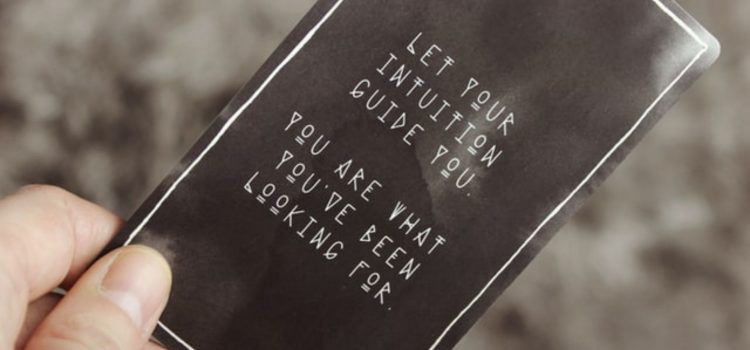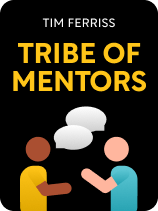

This article is an excerpt from the Shortform book guide to "Tribe of Mentors" by Tim Ferriss. Shortform has the world's best summaries and analyses of books you should be reading.
Like this article? Sign up for a free trial here.
Should you trust your intuition? How well has it worked for you in the past?
Tim Ferriss’s Tribe of Mentors contains life advice from experts in a wide variety of fields. The book also presents an alternative to taking others’ advice: trusting your intuition. But, even that choice comes with considerations, as some say that it’s vital to continually challenge your intuitive assumptions.
Read on to explore the universally relevant matter of trusting your intuition.
Should You Trust Your Intuition?
Rather than trusting the expertise of others, some of Ferriss’s experts suggest learning to take advice from yourself—trusting your intuition. But, should you trust your intuition? It’s a complex matter, so we’ll consider various perspectives.
Hedge fund advisor and chess master Adam Robinson asserts that the intuitive unconscious mind is significantly more powerful and insightful than the conscious mind. Filmmaker and author Soman Chainani elaborates, arguing that many of your conscious thoughts that seem true are actually false ideas from your past that you haven’t challenged. In contrast, your unconscious mind communicates with intuitive feelings and images that are often more accurate indicators of the truth.
| How the Unconscious Mind Works How could the unconscious mind be such a powerful source of valuable insights? Experts assert that the subconscious is insightful because it can process a massive amount of information. Conscious thought requires a lot of intense brain activity, but by freeing itself from the constraint of awareness, your brain can process information much more quickly, recognize more patterns, and come to insightful conclusions about the world that lie outside of your conscious knowledge. However, sometimes your intuitive mind comes to conclusions that contradict your conscious beliefs, as Chainani describes. One reason you may choose to cling to certain beliefs from your past despite subconsciously distrusting them is that you find it too painful to admit what you believe, so your unconscious mind hides these thoughts from your conscious mind. Unconsciously hiding your beliefs from yourself is what Sigmund Freud called “repression,” and unraveling these repressed thoughts is one of the chief goals of psychoanalytic therapy. |
Trust Your Intuition When Creating Art
Many of Ferriss’s experts assert that trusting your intuition is particularly important when you’re creating art. Actor and director Ben Stiller argues that a unique, authentic voice is what makes art compelling. In particular, he warns against overriding your intuition by modeling your art after what you assume a broad audience wants to see. Television showrunner Brian Koppelman agrees, adding that the only way you can fully dedicate your heart and soul to your work is to create what you intuitively feel drawn to create. He notes that this level of dedication is necessary for the highest creative success.
| Be Unique, but Not Too Authentic In The Practice, Seth Godin agrees that channeling your unique voice makes your art more valuable. The alternative is copying existing things, but this is just a way of hiding the true, distinctive inner voice that will enhance your creative work. However, Godin also argues that you shouldn’t concern yourself with being “authentic” when making art. Pure authenticity would be creating whatever feels right to you at the moment, but this wouldn’t necessarily be valuable. According to Godin, truly valuable art requires you to filter your authentic voice with an audience in mind, shaping your ideas into a form that changes people for the better. For instance, some critics contend that Stiller’s television series Severance is helping its audience confront their unhealthy relationship with work. Godin maintains that shaping your art into an impactful form is an inherently inauthentic process—it doesn’t come naturally. Arguably, focusing on the impact your art has on others will also get you more excited and dedicated to the work than following Koppleman’s advice of creating whatever your heart wants to create. For many, improving the lives of others is a more powerful motivating purpose than personal gratification—which may hold true even if that gratification is a form of artistic expression. |
Counterpoint: Question Your Assumptions
Although some of Ferriss’s experts advocate listening to your intuition, this advice may lead you astray if you implicitly trust that everything your gut tells you is true. Some of Ferriss’s other experts warn against this kind of unconditional confidence in your own beliefs, advising you to challenge every thought and feeling you have.
Martial artist and chess master Josh Waitzkin (The Art of Learning) advises regularly questioning everything you believe—and what those around you believe. If you don’t, you’ll default to instinctively trying to keep your worldview and beliefs static, which may cause you to suffer and prevent you from making forward progress in life.
Author and poker expert Annie Duke (Thinking in Bets) agrees, recommending that you actively search for people who disagree with you and hear them out. Set a goal to prove yourself wrong about something every day. She asserts that generally, the truth of any situation lies between two extreme opinions, and by considering both sides, you can gain a more accurate understanding of the world.
| Unlinking Identity From Beliefs According to Adam Grant in Think Again, the reason people try to keep their beliefs the same—even if it causes them to suffer, as Waitzkin says—is that their identity is tied to their beliefs. As a result, any challenge to their beliefs feels like a threat to who they are. Grant gives advice on how to unlink your identity from your beliefs and more readily change your mind. First, reflect on the times you’ve changed your mind in the past and were glad you did so. This will help you acknowledge that your beliefs naturally change over time—and that’s a good thing. Second, intentionally tie your identity to morals and values in place of beliefs. By defining yourself using values that you can express through a wide range of actions and beliefs, you can change your mind while keeping your sense of self intact. As an example, Ferriss’s experts appear to have built robust identities tied to the value of mental flexibility—they celebrate being the kind of people who challenge their beliefs daily. That said, challenging all your beliefs doesn’t mean you always have to change your mind. If you already believe something that is true, changing your mind would be a mistake. As a counterpoint to Duke, the truth of a given situation isn’t always between two extremes. Universally believing this would be falling prey to the logical fallacy of “argument to moderation”—the assumption that if a statement takes the middle position between two conflicting ideas, it must be true. |

———End of Preview———
Like what you just read? Read the rest of the world's best book summary and analysis of Tim Ferriss's "Tribe of Mentors" at Shortform.
Here's what you'll find in our full Tribe of Mentors summary:
- Distilled life advice from over 130 world-class experts in various fields
- How to navigate non-traditional career paths, appreciate failure, and more
- Why you should allow a small amount of measured chaos in your schedule






